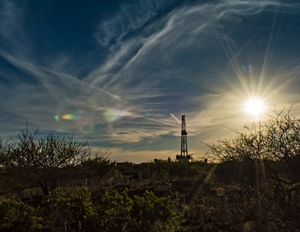Regional collaboration will build on the Permian basin’s status for the global energy community
March 30, 2023 -- Austin, Texas. The Permian Energy Development Laboratory announced the signing of a memorandum of understanding among seven New Mexico and Texas universities, two national laboratories and a center for advanced energy research at UT Energy Week 2023. The MOU reflects a shared goal of conducting advanced energy research and deployment, educating the next generation of energy professionals, and supporting energy-intensive communities and the natural resources they depend on.
Participating institutions to date include the Houston Advanced Research Center, Midland College, the U.S. Department of Energy’s National Renewable Energy Laboratory, New Mexico State University, New Mexico Tech, Odessa College, Sandia National Laboratories, The University of Texas at Austin, The University of Texas at El Paso, and The University of Texas Permian Basin. The Cynthia and George Mitchell Foundation launched the effort and continues to incubate the startup organization.
MOU INTRODUCTION SESSION
The PEDL introduction session was moderated by Andy Uhler, fellow at the Energy Institute at the University of Texas at Austin, and Center on Global Energy Policy at Columbia University. The representatives for several of the participating institutions gave input about the focus and purpose of the industry and academic collaboration. Speakers included:
Tramaine Anderson, vice president for instruction, Odessa College
Marilu Hastings, executive vice president, Cynthia and George Mitchell Foundation
Bill Murphy, CEO, University Lands
Sunday Shepherd, general manager, strategy, Chevron
The presentations focused on the history of the Permian basin and the impact of extended-reach horizonal drilling and staged fracing techniques. The panel also provided input on the role of ESG and how the industry will attract, recruit and retain top HR talent in a difficult business environment.
Other discussion was provided on the role of the university system and how the industry can diversify to solve the challenges surrounding operations in the Permian, such as water conservation and recycling produced water. The collaboration will work on re-educating the work force to build renewables, including solar panels and other non-oil and gas power-generating technologies. A reoccurring theme was the decarbonation of energy generation, using hydrogen, geothermal and CCUS. The Permian is one of the leaders in the U.S. for research and technology development.
“We want to have meaningful conversations with our students about improving air and water quality, while reducing the Permian’s carbon footprint,” said Tramaine Anderson, vice president for instruction, Odessa College. Another idea about how to utilize Permian land for renewables was suggested by Marilu Hastings, executive vice president, Cynthia and George Mitchell Foundation. “There are many landowners in the Permian that have no mineral rights but might be receptive to using their land for solar and wind power. After all, there is no shortage of sun and wind in West Texas,” Hastings mused. Discussion also touched on the role of artificial intelligence and machine learning.
Industry must grow and evolve. The panel then described the collaborative research agenda that will focus on research and development. The lab’s scientific technology deployment efforts will focus on four primary areas of inquiry:
- Advanced energy, fuels and integration.
- Carbon and materials management.
- Water, land and agriculture
- Economic development
Education and workforce efforts will introduce students to advanced energy concepts, to prepare them to excel in the technology and energy careers of the future, create higher education credentials that support employment in Texas’s cutting-edge energy industries, and encourage advanced energy job creation and entrepreneurship.
COMMUNITY
The lab’s community engagement efforts will include short- and long-term programs, including town hall meetings to gather initial input for creating an entrepreneur resource center and scholarship programs to prepare students to work with new energy technologies. The goal is to create opportunities for everyone living in and around the energy sector and share the benefits and costs fairly.
Texas and southeastern New Mexico are positioned to win the race to build the world’s next-generation energy technologies. The Permian basin has the resources, know-how, and workforce to ensure success. The Permian Energy Development Lab will ensure that the region drives the global landscape of energy technologies.



